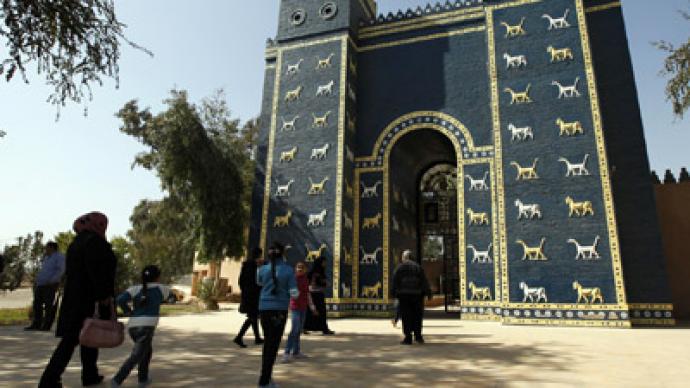Hanging by a thread: Babylon World Wonder at risk from oil

The site of the legendary hanging gardens of Babylon is in danger of being wrecked by an oil pipe. The historic area in modern-day Iraq has seen many invasions over the years, from Roman to American, but now faces a domestic threat.
The magnificent gardens allegedly built for a king’s homesick wife in the 6th century BC were one of the Ancient World’s seven wonders. Some historians doubt they existed, but they were described in many written sources and were said to have been destroyed by earthquakes. The remains of the ancient city of Babylon are situated near present-day Al Hillah in Iraq’s Babylon Province south of Baghdad. The country has long been trying to get UNESCO to add the site to its World Heritage list, but chances appear to be fading away as authorities plan to lay an oil pipeline there.Iraq’s Oil Ministry plans to extend a strategic route to export oil through six provinces at the center and south of the country.Two pipelines carrying oil products and liquid gas from Basra in the south to Baghdad were built under the ancient site in the late 1970s and early 80s. A third 1.5 km line was officially opened in March, and now the Oil Ministry wants to extend it through the wall of Babil Fortress – a 1,400-year-old historic castle revered as an archaeological treasure.The General Authority for Antiquities and Heritage in Iraq has filed a lawsuit against the Oil Projects Committee to prevent what they call the further destruction of the fortress.Archaeologists say greed for oil money could cause irreparable damage to an ancient area that has already suffered repeatedly and was plundered during the US invasion of Iraq. The pipeline would pass right through the archaeological site from north to south, says Qais Rashid, head of Iraq’s Supreme Board of Antiquities and Heritage. He fears “the work could damage priceless antiquities belonging to the modern era of Babylon, especially by drilling.” Rashid is sure the project presents “major risks,” including pollution of the environment, and the threat of a potential explosion.But Oil Ministry spokesman Assem Jihad insists the project poses no threat. He says the work already done “was carried out… hundreds of meters from the archaeological sites.” The official added that “no evidence of the existence of antiquities had been found during the drilling operations.”
Expert on Iraq Mike Raddie says the country's elite are driven by profit."For the 99 per cent of us it’s the heritage of the cradle of civilization and the history of Iraq is more important. But those who serve the elites and the global oil companies, to them world heritage and antiquities mean nothing. To them, the most important thing is the mighty dollar, and they will stop at nothing to get what they see as their own resources," he told RT.
Babylon is considered one of the cradles of human civilization, mentioned in the Bible as well as by ancient historians. It was partially excavated over the past century by European archaeologists, who took most of the treasures to French and German museums. The ancient site suffered further under Saddam Hussein, who constructed a huge palace there, severely damaging the landscape. The former Iraqi leader also carried out a “reconstruction” of some parts of the site, ornamenting bricks with his initials and texts glorifying him and his rule. US troops turned ancient Babylon into a military base, damaging the historical site by “digging, cutting, scraping and leveling”, according to a 2009 UNESCO report. The world-famous Ishtar Gate and Processional Way were among key structures damaged, while contents of the Nebuchadnezzar and Hammurabi museums and of the Babylon Library and Archive were stolen and destroyed during the war. Now, Babil Fortress that has withstood Assyrian, Roman, Islamic and American invasions, is under threat from the new Iraqi government’s desire for cheap oil exports.













